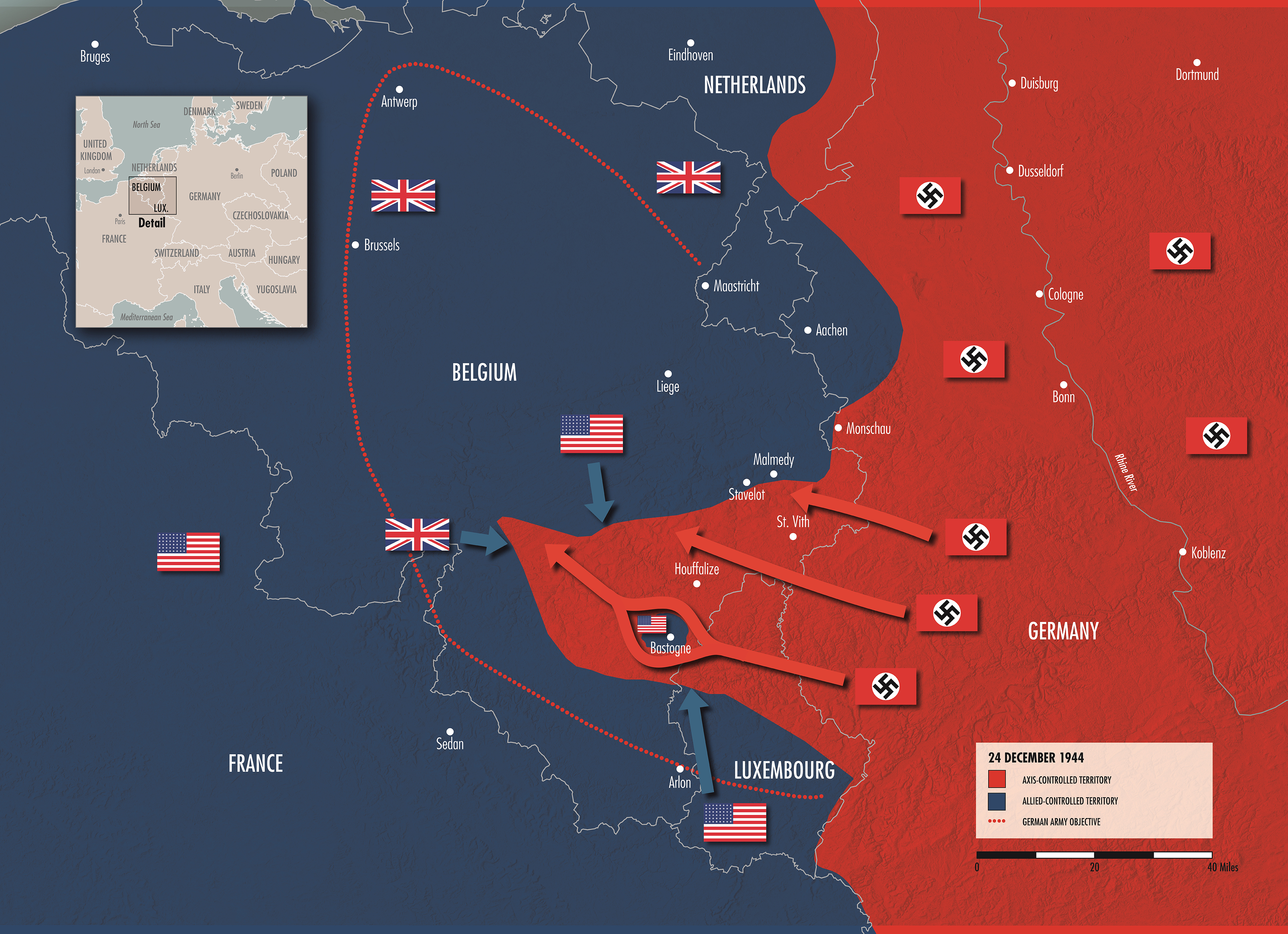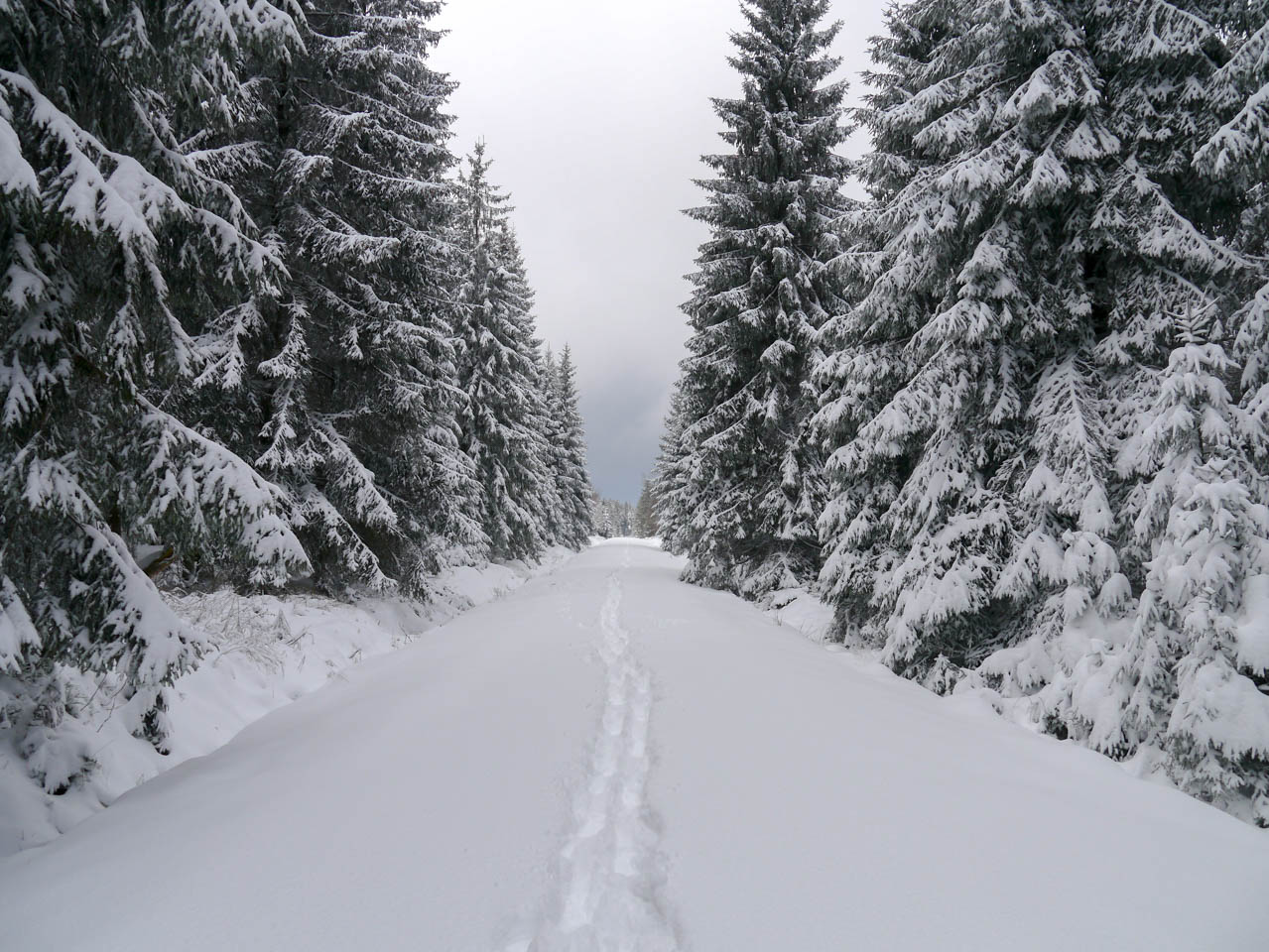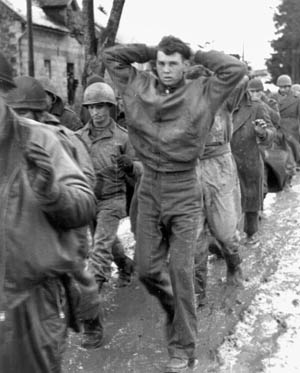This article is the second chapter of a three-part series on the experiences of a WW2 veteran and former Jesuit Track and Field Head Coach Herb Sheaner. In the last article, Mr. Sheaner discussed his high school and college years, and his initial service in the Army before the Battle of the Bulge.
The Battle of the Bulge, or the Ardennes Offensive, was a massive German attack in the forested, snowy Ardennes forest. The region was lightly defended by American troops, and the Germans would amass nearly 400,000 men for the offensive. After their initial attack, American reinforcements poured into the forest and a two-month-long battle ensued. It was the costliest battle in American history, with nearly 90,000 Americans killed, wounded, or captured. German losses were around 100,000.
In the midst of this horrific bloodshed was the 19-year-old Herb Sheaner. This is the second part of his story, describing his personal experiences during the battle.
***Warning – the following article describes violent events including combat and death. Some of the photos in this article, reflecting upon the violent nature of the Second World War, also depict injured or dead soldiers. Viewer Discretion is advised.

On the day of the German attack, where were you and can you share with us your experience, what was going through your mind at that time?
Well, the time was midnight to four o’clock in the morning. I was standing guard. The Germans attacked at five. By that time, I wasn’t down there in front of our lines. I’d already come back through that opening and the barbed wire up the trail and got in my little hut.
So when the Germans attacked, nobody told me and I didn’t know it. I was a good sleeper! So I slept through in that whole damn place while the Germans were overrunning our positions. Undoubtedly, today I would think they could have opened up a door and thrown a hand grenade in there. But suddenly, everything settled down.
Well, I finally woke up and got out of there and started off down the hill a few feet, and my helmet came off. But I had my gun and I was ready to go, but by that point, nothing happened. I was thinking ‘What happened? What saved us from being overrun?’
It was our mortar section in the company. They lobbed mortars right out in the front lines. Well, while that was going on the Germans were attacking our outpost and that outpost had a whole squad of men, maybe 10 or so Americans in that one outpost.
That’s what they were attacking. If they got through that, the next thing would’ve been coming to where I stood guard and probably gone trying to go up that trail. But we had our mortar section ready.
:max_bytes(150000):strip_icc()/GettyImages-615312828-1c05265abb994a3c89cc63da0199a964.jpg)
So when they were making these loud noises around 3:30 or 4:00 in the morning walking around, you could hear the clinking of tanks and engines of trucks. There was somebody doing something out there. And when they opened up their attack on the outpost, boy, our CO (commanding officer) called in the mortars. They just dropped in the exact position where the Germans were attacking.
He had the right coordinates. Right on top of the Germans. I mean, it destroyed a whole German company. And remember, artillery was the deadliest weapon of the war. More people were killed in artillery strikes than by firearms. They hit the trees and the limbs fall down and hit people. And the shrapnel hits people in the shoulders and it disabled people, but they never used artillery on us thankfully.

And they brought up some of the dead Germans outside of my post here, outside of my little hut, when I got out, they had a dead German officer, just a few feet in front of me.
And they also brought a boy about my age, I guess 18 years old. He was dead, but he wasn’t dead when they brought him up the hill. You know, they were trying to get him to medical service. But he was too well gone.
It was the first time I’d seen anybody dead. And I looked down at him, I said, that looked like any young soldier like me. And the other guy looked like my captain. I felt sorry for them. But we stopped that attack there.

Well, I know now that the Germans were really just keeping us in place. They didn’t have anything behind them. They were just keeping us there, while the main thrust of the Germans with their tanks was going around us.
Yes, they were going around us. The Germans were smart. Get the tanks, go around us, and surround our entire unit and as it ended up, we ended up being cut off. Most of the 106th Infantry Division (about 9,000 American soldiers) were surrounded by a pocket of woods. Cut off and without supplies.
Our front was just too long. 26 miles! I mean, a single infantry division is supposed to be in a little 5-mile area. There were too many gaps in that hole. We ended up having to march back to defend our regimental headquarters.
And an open pasture beside it must extend uphill for a couple hundred yards. In the meantime, my company decided to join the regimental headquarters people and go get us a hot breakfast. So we had the eggs and bacon, a good breakfast, and all the company men were there.

When you were surrounded and cut off by the German tanks, when did you realize that you were cut off and what was that feeling like?
I don’t think we realized when we went over sideways on the front lines to protect our regimental headquarters. I don’t think we even thought we were surrounded. But we knew something was wrong when the artillery started evacuating to St. Vith, a town a few miles to the west.
The Germans meanwhile were planning on leaving us there as long as we wanted to stay and just go around us. And that’s what they did. They hit a road near our position, and just ran circles around us. We were up here in this pocket, with no idea what was going on, whilst the Germans were driving towards the Atlantic Ocean.
They couldn’t go through the forest where we were with their tanks. Throughout the entire battle, we didn’t see any German tanks. That’s unusual. But the Germans needed to do this swiftly and, they didn’t need to fight and fight us cause they got more fighting going on to go behind us.
They can just surround us, which they did. And we left our food and we had a lot of food in the kitchen there for the cooks to cook meals. All that, all we might have had on was a nutrient candy bar that they give you that that’s your meal, like the D rations and C rations. And we could survive on just eating those. We subsisted on those bars for the next five days.
While this was going on, we had failures in leadership. Our general, General Jones, was panicking in St. Vith because he knew that we were surrounded to the east. I learned later that General Jones could have pulled us out, but he was ordered not to retreat so he kept us there.
Nobody told our general to do that. So he finally, after a few days, just got a nervous breakdown and got relieved. His son had been captured with us, and he couldn’t take it. We were in a bad situation.

With news of the Malmedy Massacre, what were your thoughts when your unit was captured by the Germans?
***Note: The Malmedy Massacre occurred when roughly 80 American prisoners were shot and killed by their German captors during the Battle of the Bulge. Such massacres of prisoners were rare but not unheard of, and both sides partook in the killing of unarmed prisoners throughout the battle.
By that point, I was dug into the hillside there with an outfit of anti-aircraft gunners. They had a big old truck there and they gave a machine gun on it and it was designed to shoot down aircraft. It was also pretty good at killing Germans, and they didn’t even know that it was there. The Germans attacked again, mostly infantry, and got burnt up by the anti-aircraft gun.
Every time the Germans attacked us, we beat them off but we were running out of ammunition, food, and medical supplies. The Germans finally organized artillery, tanks, and troops to launch an attack.
The Germans wanted us to surrender, they threatened to bombard the entire forest and charge us with tanks. We didn’t have any weapons to stop tanks. Our officers grouped around where we couldn’t see them.
They really couldn’t really make up their minds. A day or two later, a German officer came out across an open field with a white flag and told the officers ‘we’ve got the artillery now that we’re gonna lay on on you, and we’re not gonna lose anybody because you don’t have anything to shoot back at us with.’

It was then that the officers decided to give up. They must have thought we were going to get slaughtered. My captain and the lieutenant in my company didn’t want to surrender. But everybody else, all the other officers did. So we said that we would surrender.
So as a part of the surrender, we were going to start walking single file, out of our fox holes into grass opening and going in the direction of Schaumburg, a little town that was just back that way, half a mile from us.
I was one of the first to go down the hill and with the anti-aircraft people. Cause that’s where I was at. I wasn’t scared. I didn’t know anything about Malmedy.

None of us knew anything about that. That did happen, but that happened much later. I think 20 or 30 miles on deeper towards the west. And it happened with some troops that the Germans brought in that had been fighting the Russians on the eastern front. They were mean because the Russians were mean too.
On the eastern front, they don’t take any prisoners. So when the Americans surrender on the western front, we expect to not be killed. But those German tankers at Malmedy didn’t get the message.
Anyways, I was one of the first six to get down the hill and one of the Germans reached over here, and grabbed my arm, trying to get my watch. I’m sure that must have been common during a war, to take people’s watches and things as trophies.
But this young German lieutenant barked an order, saying give that back to him. So he got his own German soldier back here and gave the American back his watch and I thought that was pretty damn nice. You know, they weren’t gonna search us. They didn’t take anything from us.
Then I with all the rest of everybody was down in the town and the Germans were going by and trucks, headed west to keep trying to push the Americans back. And I wondered what my mother would think about me if she could see me like this.

I felt pretty low throughout my captivity. My family never did know that I was a prisoner of war. Not just me, but most of these guys that were captured, Germans just didn’t report it. My family just got a letter from the War Department saying I was Missing in Action – MIA.
No, they didn’t know whether I was alive or not. My mother tells me that she grieved over that every night and thought about it. And while she went to bed here in Dallas, she said an angel told her “stop, don’t worry. Your son’s all right, he’s alright.”
And she stopped worrying. During this whole ordeal, I just felt like if anybody else can make it, so can I.

*Part Three of the Herb Sheaner Trilogy will cover his further experiences as a prisoner of war, his return home, and coaching with Jesuit Dallas.
